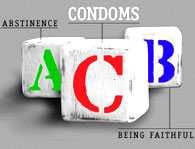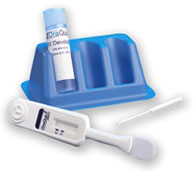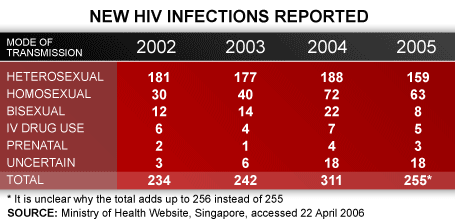The 2005 HIV incidence data for Singapore has just been released and the most striking thing is that homosexual transmission accounted for 25 per cent of the new infections. Sixty-three of the 255 new cases detected last year fell into this category. Eight other cases were reported from persons who were bisexual, while 159 persons were believed to have been infected through heterosexual sex. The rest were infected by unknown or non-sexual routes.

''... the (Health) Ministry's idea of 'tailoring' the message for the gay community is merely to permit the 'ABC' message (Either Abstain, Be faithful, or use Condoms), with the C being the concession to the gay community. Everywhere else in Singapore, the message is only 'AB.'''
Singapore's Health Ministry does not use the less loaded term "men who have sex with men" (MSM) in their statistics.
While the total number of new cases in 2005 was lower than in the previous year - 255 cases in 2005 compared to 311 cases in 2004 - it is still higher than in 2003 and all previous years. It is clear that the disease has become endemic in Singapore, with a concentration within the gay male community.
Unfortunately, 2005 was largely spent on infighting between the Health Ministry and the gay community.
Things got off to a very bad start in early March 2005 when Dr Balaji Sadasivan, the Senior Minister of State for Health, told Parliament that a possible reason for the spike in HIV infection among gay males in 2004 (72 new cases compared to 40 in 2003) could be the Nation parties organised by Fridae. He conceded that his ministry didn't have hard data to show the connection.
Coming just months after the 2004 Snowball party was banned by the Singapore government, many gays, particularly the party-loving set, were incensed by what they felt was his 'shoot first, ask questions later' approach.
The high degree of antipathy made the gay community even more suspicious than they already were about the government's motives.
Meanwhile, Action for AIDS, the leading non-government organisation dedicated to HIV prevention, wondered whether their successful campaign in 2004 to get people to come forward for testing might have created the statistical blip that so alarmed the minister. But all this was speculation too; Singapore seems to be very short on epidemiological data even as the disease appears to be growing.
Bangkok, for example, carried out two large surveys in 2003 and 2005. In the earlier one, anonymous tests done at 16 known gay venues, such as bars and saunas, found a prevalence rate of HIV among MSM to be 17.3 per cent. As if this was not alarming enough, the 2005 study, done at the same 16 venues, found a prevalence rate of 28.3 per cent. This percentage was obtained from the 113 positives detected from 400 men who were not commercial sex workers.
One cannot help but wonder if the prevalence rate among Singapore MSM is also in significant percentages, for the 63 new cases found among homosexuals in 2005 is only marginally fewer than the 72 cases discovered in 2004. The relative concentration of cases in the gay community cannot be denied. But how bad is the situation? Alas, there is no funding available for any baseline survey.
On the other hand, Dr Balaji did promise that funding for HIV prevention campaigns would be available. He even accepted the principle that messages should be tailored to target communities. While that sounded hopeful, unofficial reports from persons who tried to design and implement education campaigns in 2005 were that they met a lot of resistance from the Health Ministry whenever the message became gay-affirmative. Not a few plans were scratched as a result.
There seemed to be the expectation among the civil servants overseeing the matter that a generic "ABC" message, with some tweaking, would be enough. Anything that suggested a recognition that gay sex was going on and may go on, if safely, was a great big no-no.
One naturally wonders whether the Ministry's idea of "tailoring" the message for the gay community is merely to permit the "ABC" message (Either Abstain, Be faithful, or use Condoms), with the C being the concession to the gay community. Everywhere else in Singapore, the message is only "AB."
For example, Dr Balaji flatly ruled out high-profile condom campaigns on the streets, a tactic that anti-AIDS activists have carried out in Thailand, on the grounds that people might be offended.
As well, repeatedly through 2005, there were letters in the press lauding abstinence and condemning condoms, which were said to have a high (10 - 15 per cent) failure rate, a (false) claim that was attributed to the US Centers for Disease Control. This was a gross misrepresentation of the research data and CDC's stand.
The same scare-mongering tactics were used in school sexuality education programs, many of which were outsourced to fundamentalist Christian organisations, since the teachers themselves were reportedly too embarrassed to talk about sex to their pupils.
As if it wasn't bad enough that HIV prevention programs for the gay community were often stillborn, by the later part of 2005, Dr Balaji's focus shifted to self-testing.

The OraQuick ADVANCE Rapid HIV-1/2 Antibody Test Kit (SGD25) is available at various outlets including the Anonymous HIV Testing & Counselling Clinic local at the DSC Clinic, 31 Kelantan Lane, #01-16 (Tel: 62540212 or email afa@pacific.net.sg).
Indeed, it seems inexplicable that the Singapore government is so focused on self-testing rather than public education and safe sex. After all, someone would only want to test if he is concerned about being infected, but right now, the problem is to get people concerned in the first place. Making self-testing kits available doesn't do anything towards changing the 'head in the sand' attitude too many have to AIDS.
Nor is encouragement to test, in the form of subsidised treatment if one is found positive, available. The government has steadfastly refused to assist in any major way. That being the case, AIDS activists have pointed out, people may prefer not to know for as long as they can.
But the focus on self-testing is not inexplicable when seen in connection with the other priority of the Ministry - which is to prosecute anyone passing the virus to another. Ignorance of one's HIV status will not be a permissible defence, given that self-testing kits are available.
Somehow, this is completely consistent with the stereotype of Singapore, a place that is moralistic and punitive. Here, the message seems to be, when you're about to have sex, reach not so much for the condom, but for the statute book.
Alex Au has been a gay activist for over 10 years and is the co-founder of People Like Us. Readers who have experience with applying for Dependent's Passes for their same-sex spouse to live together in Singapore could write to him so that that gay activists in Singapore can have some facts to go on. He can be contacted at yawning@geocities.com.
Fridae and Action for Aids are running the 2006 MSM survey from April 6 to 30 and wants all MSM (men who have sex with men) - gay, bisexual, straight, queer or what have you - to participate. Your participation is highly valued and will have a significant impact on the future of AIDS campaigns targeting MSM. 15 minutes of your time is all you need to give a voice to the important issue of HIV prevention. Click here to join.












 Printable Version
Printable Version










Reader's Comments
Be the first to leave a comment on this page!
Please log in to use this feature.